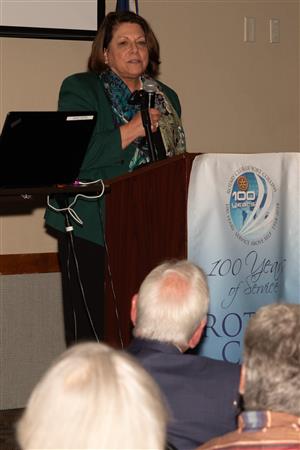 On October 9, Joyce McConnell, the 15th (and first female) President of Colorado State University, presented the annual the State of the University. This event continues a Rotary Club of Fort Collins tradition that dates back to the administration of William E. Morgan, also a former member of our club who served as Colorado A&M I Colorado State University President from 1949 to 1969.
On October 9, Joyce McConnell, the 15th (and first female) President of Colorado State University, presented the annual the State of the University. This event continues a Rotary Club of Fort Collins tradition that dates back to the administration of William E. Morgan, also a former member of our club who served as Colorado A&M I Colorado State University President from 1949 to 1969.Dr. McConnell started by comparing CSU with Rotary: both are dedicated to public service. One focus of the university is providing access to underserved populations. Using examples from her own life, she highlighted the potentially transformative results of quality higher education, pointing out that her college and post-graduate education set the stage for her to have a much wider impact on society than her cousins who never had that opportunity.
None of us are isolated from the rest of society. Universities like CSU play a critical role in encouraging and supporting democratic institutions, developing responsible citizens, and encouraging civic engagement. CSU is a 'community' of 50,000 people, counting faculty, staff, students, and support; some of those people make mistakes that they ultimately regret, but the university as a whole has a dramatic positive impact on the surrounding society.
In response to a question about childhood education, President McConnell pointed out that CSU has extension services in every county in Colorado. Although, in the past, those extension services have focused on agriculture, now much of the effort is also devoted to STEM education and providing hubs for communities.
Questions from the audience addressed diversity in the educational curriculum, particularly with respect to the liberal arts as opposed to STEM. Much of the academic work at the university is now interdisciplinary, both for students and faculty, so that the entire spectrum of academic disciplines is being addressed and that emphasis is continuously evolving.
Addressing the rising cost of higher education, President McConnell made three points: 1. Although total costs have increased, state funding all across the country has dramatically decreased. 2. Students, parents, and other constituents have continuously asked for more services. 3. Ongoing and increased prosperity in the state requires more investment in education, not less.